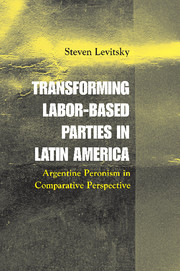Book contents
- Frontmatter
- Contents
- Figure and Tables
- Acknowledgments
- 1 Labor-Based Party Adaptation in the Neoliberal Era: Rethinking the Role of Party Organization
- 2 Origins and Evolution of a Mass Populist Party
- 3 An “Organized Disorganization”: The Peronist Party Structure in the 1990s
- 4 Populism in Crisis: Environmental Change and Party Failure, 1983–1985
- 5 From Labor Politics to Machine Politics: The Transformation of the Peronist Party–Union Linkage
- 6 Menemism and Neoliberalism: Programmatic Adaptation in the 1990s
- 7 A View from Below: Party Activists and the Transformation of Base-Level Peronism
- 8 The Paradox of Menemism: Party Adaptation and Regime Stability in the 1990s
- 9 Crisis, Party Adaptation, and Democracy: Argentina in Comparative Perspective
- References
- Index
8 - The Paradox of Menemism: Party Adaptation and Regime Stability in the 1990s
Published online by Cambridge University Press: 22 December 2009
- Frontmatter
- Contents
- Figure and Tables
- Acknowledgments
- 1 Labor-Based Party Adaptation in the Neoliberal Era: Rethinking the Role of Party Organization
- 2 Origins and Evolution of a Mass Populist Party
- 3 An “Organized Disorganization”: The Peronist Party Structure in the 1990s
- 4 Populism in Crisis: Environmental Change and Party Failure, 1983–1985
- 5 From Labor Politics to Machine Politics: The Transformation of the Peronist Party–Union Linkage
- 6 Menemism and Neoliberalism: Programmatic Adaptation in the 1990s
- 7 A View from Below: Party Activists and the Transformation of Base-Level Peronism
- 8 The Paradox of Menemism: Party Adaptation and Regime Stability in the 1990s
- 9 Crisis, Party Adaptation, and Democracy: Argentina in Comparative Perspective
- References
- Index
Summary
This book has argued that the PJ's capacity to adapt to the opportunities and constraints of the neoliberal era was critical to its survival as a major political force. The following chapter takes the argument a step further, making the case that the Peronist adaptation contributed in an important way to the performance and stability of Argentine democracy. Argentine democracy was surprisingly successful during the 1990s. Core democratic institutions such as free elections, the protection of civil liberties, and civilian control over the military became firmly established. Indeed, these institutions proved sufficiently robust to survive a hyperinflationary crisis, radical economic reform, and the abuses of the Menem government.
One of the keys to understanding this outcome lies in the transformation and survival of Peronism. The socioeconomic crisis of the 1980s and 1990s posed a fundamental threat to established parties and party systems in Latin America. This was particularly the case in what Roberts (1997a, 1998b) calls labor-mobilizing party systems, or party systems in which established labor-mobilizing parties are central actors. Where labor-mobilizing parties failed to adapt to the challenges posed by socioeconomic crisis and neoliberalism, as in Peru and Venezuela, party systems collapsed (Roberts 1997a). In theory, the collapse of established parties should lead to the emergence and consolidation of newer, more representative parties. In such a case, party decline would simply result in a realignment of the party system. In contemporary Latin America, however, the failure of established parties has more frequently led to party system fragmentation or decomposition.
- Type
- Chapter
- Information
- Transforming Labor-Based Parties in Latin AmericaArgentine Peronism in Comparative Perspective, pp. 217 - 230Publisher: Cambridge University PressPrint publication year: 2003



